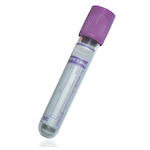Lipoprotein a (Lp(a)) Genotyping (LIPOAG)
Specimen Volume
5 mL Whole BloodSpecimen Transport
UsualSample Preparation
Do not centriuge or freeze
Turnaround Time
3 DaysSample Stability
4 oC in research rack in CSUGeneral Information
Lipoprotein(a) (Lp(a)) is a plasma lipoprotein which consists of an apo(B) containing LDL-like particle covalently linked to a large glycoprotein, apo(a). Elevated plasma concentrations of Lp(a) are a risk factor for coronary heart disease, cerebrovascular disease, atherosclerosis, thrombosis and stroke. Apo(a) is encoded by the LPA gene with variation in the LPA gene accounting for around 90% of the variation in Lp(a) levels with size of the genetically determined Kringle 4 type 2 (KIV-2) repeat in the LPA gene affecting the size of the apo(a) protein.
Small numbers of KIV-2 repeats, and hence small isoforms of apo(a), are associated with an increased risk of CVD and atherosclerosis and can give erroneously low levels of Lp(a) when measured on some assays.
This assay will determine the number of KIV-2 repeats via qPCR and will also determine the presence of absence of two SNPs, rs10455872 and rs3798220, which are associated with an increased odds ratios for CAD.
For more information, please see the links to the publicaitons below.
Patient Preparation
No preperation required.
Test will not be performed without a completed patient consent form and permission from the relevent consultant.
Notes
Please only place samples for Lp(a) genotyping in the CSU pot if it is clearly indicated on the request form (e.g. LIPOA GENOTYPING). All samples for immunochemical measurement of Lp(a) DO NOT require Lp(a) genotyping.
Any questions please contact Dr Alex Lawson on 43235 or the duty biochemist on bleep 2506
Reference Range
Interpretative comments will be attached to report.
Specifications
- EQA Status: No EQA scheme available.
- EQAS Scheme: Yes








